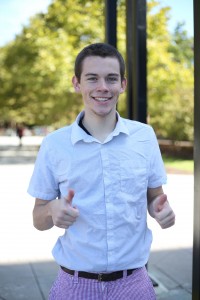Freshman Stephen Wegman received 83 more votes than the second-place Senate candidate and 148 more than the first runner-up in the Class Council elections. A total of 673 votes were counted in each election, both run through the Students’ Association (SA).
Hailing from Rochester, Wegman is an economics major whose campaign strategies proved key in snagging both wins. The CT sat down with Wegman to learn more about his motivation for running, his reactions, and his goals for the future.
Q: Why did you decide to run for both Senate and Class Council?
A: Over the summer, I realized the foremost extracurricular activity I wanted to get involved in at the University was student government. I spoke with my sister about the different aspects of student government at UR. I came to the conclusion then that I would run for both positions to get the broadest student leadership experience here.
Q: You won the Class Council election with twice the number of votes than runner-up. You also led in the Senate race. How did you react to this?
A: I was utterly surprised. In hindsight, I guess I did employ a number of successful campaigning techniques, but I tried to channel my excitement during the process into further promotion. I think some of my campaigning techniques such as chalking and talking directly to students reflect exactly what Class Council aims to do: unify the student body.
Q: The chalk on the steps drew quite the attention. What was your inspiration?
A: I expected chalking to be a popular campaign move, but the response and impact far surpassed my expectations. As for the idea, a colleague of mine came up wit hit. I’ll take credit for most of the labor though; the chalking itself took nearly three hours to complete. A subsequent photo of the chalked stairs is, as far as I know, one of the most liked posts on the Class of 2017 Facebook page. It felt tremendous to have done something that so many of my peers appreciated.
Q: How else did you promote your election, and did you run into any ineffective strategies?
A: The most important thing I did before campaigning was seeking advice from upperclassmen. They were able to give me ideas to use in my campaign as well as help me refine some of my own ideas for maximum efficacy. The combination of techniques was what made each one more successful.
As I went around to dorms and lounges to speak with students, I would get enthusiastic comments like, “Oh, I saw your posters literally everywhere.” or “Your chalking on the stairs is so awesome. I’m voting for you.” Giving people a face to go with my promotions was what really solidified a large number of my votes.
For this reason, I found certain strategies very ineffective. I had a grand total of about three people mention seeing my name on the painted rocks and tunnel. This was not necessarily a letdown because it caused me to focus my attention elsewhere, towards greater personal interaction with classmates. From the poster and chalking materials, students aptly recognized my name, face, and social media presence. Conversely, with the paintings, students simply saw a decoration that they quickly forgot.
Q: Through your upcoming roles, what are some things you hope to change on campus? What most excites you?
A: I realized while campaigning that there was a great problem among the student body: many do not understand the different parts of SA or know what its function is. To facilitate a better relationship between the student body and administration, there needs to be a more educated understanding of the liaison that is SA. There are so many concerns students have that have not yet been brought to the attention of the administration. If students were more inclined to contact representatives, the representatives could do more to improve student’s daily lives on campus.
I know I will be involved in many different projects in SA, many which will not directly incorporate the whole student body. It is my personal goal to merge the gap between students and administration, and I hope to use SA as a means of doing that.
Kerem is a member of
the class of 2015.



